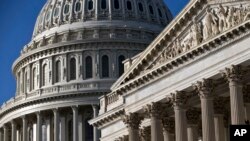CAPITOL HILL —
The U.S. Senate has voted to advance a bipartisan deal to fund the federal government for two years, paving the way for final passage later this week. The compromise agreement reduces the risk of a government shutdown, after two years of bitter budget wrangling in Congress.
Senators voted 67 to 33 to end debate and proceed to a decision on the agreement reached last week by Republican House Budget Committee Chairman Paul Ryan and Democratic Senate Budget Chairman Patty Murray. Twelve Senate Republicans broke ranks with their fellow party members and voted with Democrats to move forward on the measure. Murray said both sides made sacrifices to get a deal.
"This bipartisan bill takes the final steps towards rebuilding our broken budget process and hopefully towards rebuilding our broken Congress," said Murray.
Bitter budget fights have paralyzed Congress for much of the last two years and resulted in a costly, 16-day government shutdown in October. After the shutdown ended, Congress appointed members of the house and senate from both parties to a small committee to craft an agreement.
The deal sets government spending at about $1 trillion annually for the next two years. It raises revenues through increased security fees on airline passengers and by cutting pensions of future federal workers. Most Senate Republicans voted no, saying the bill does not do enough to tackle the country's debt. Republican Senator Jeff Sessions of Alabama was not happy with the result.
"But what occurred is not sufficient in any way and it has been postured to look a good bit better than it is. Essentially we remain on an unsustainable financial path in America," said Sessions.
Some Democratic lawmakers were unhappy that the bill does not extend unemployment benefits for the long-term jobless that are set to expire December 28. Additionally, the bill does not address the debt ceiling, which will likely have to be extended around February of next year. Congressional leaders, however, said the compromise deal would provide much needed certainty for the U.S. economy by avoiding the risk of another government shutdown in January.
The budget bill passed by an overwhelming 332-94 vote in the House of Representatives last Thursday, and is expected to pass in the Senate as early as Wednesday, before heading to President Barack Obama's desk for his signature.
Senators voted 67 to 33 to end debate and proceed to a decision on the agreement reached last week by Republican House Budget Committee Chairman Paul Ryan and Democratic Senate Budget Chairman Patty Murray. Twelve Senate Republicans broke ranks with their fellow party members and voted with Democrats to move forward on the measure. Murray said both sides made sacrifices to get a deal.
"This bipartisan bill takes the final steps towards rebuilding our broken budget process and hopefully towards rebuilding our broken Congress," said Murray.
Bitter budget fights have paralyzed Congress for much of the last two years and resulted in a costly, 16-day government shutdown in October. After the shutdown ended, Congress appointed members of the house and senate from both parties to a small committee to craft an agreement.
The deal sets government spending at about $1 trillion annually for the next two years. It raises revenues through increased security fees on airline passengers and by cutting pensions of future federal workers. Most Senate Republicans voted no, saying the bill does not do enough to tackle the country's debt. Republican Senator Jeff Sessions of Alabama was not happy with the result.
"But what occurred is not sufficient in any way and it has been postured to look a good bit better than it is. Essentially we remain on an unsustainable financial path in America," said Sessions.
Some Democratic lawmakers were unhappy that the bill does not extend unemployment benefits for the long-term jobless that are set to expire December 28. Additionally, the bill does not address the debt ceiling, which will likely have to be extended around February of next year. Congressional leaders, however, said the compromise deal would provide much needed certainty for the U.S. economy by avoiding the risk of another government shutdown in January.
The budget bill passed by an overwhelming 332-94 vote in the House of Representatives last Thursday, and is expected to pass in the Senate as early as Wednesday, before heading to President Barack Obama's desk for his signature.




